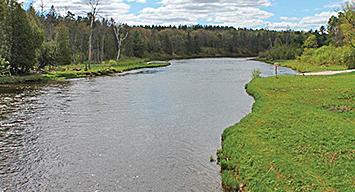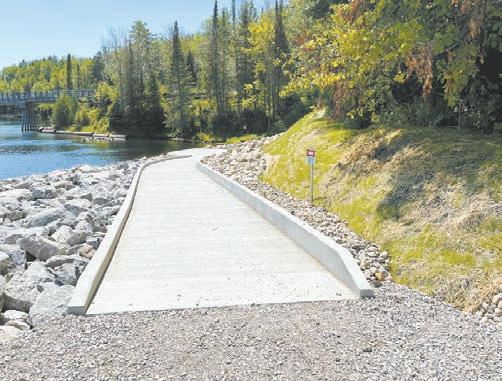
5 minute read
Rookie Reverence
Unique perspectives of first time Marathon competitors
Cecili Bugge and Holly Orr at Paddler Introductions in Grayling.
Advertisement
By Ilene Geiss-Wilson
The 74th running of the Consumers Energy AuSable River Canoe Marathon, scheduled for July 30 & 31, 2022, is a 120-mile non-stop canoe race from Grayling to Oscoda that attracts racers and spectators from around the U.S, Canada, and beyond. Racers in the AuSable Canoe Marathon must be in top physical condition. They are paddling 60-70 strokes per minute for anywhere from 14-19 hours straight. You read that correctly – non-stop with no breaks; even in the dark. They are only allowed one small light on the front of their specialized racing canoes. Now imagine trying that for the very first time. Many racers don’t live in the area and can’t train on the AuSable; they can’t learn where the log jams are, the shallow spots or where the main stream seems to detour.
According to John Cherven, marathon volunteer since 1983, first-time racers or “Rookies”, are an important part of the Marathon. “They bring fresh energy, ensure the growth of the sport and bring good publicity, thereby attracting even more racers.” There is a vetting process for first timers that involves answering questions about their skill level, what equipment they own, who their Feeding Crew will be and what past races they have participated in. Cherven said, “Over the years, I have advised some potential racers that they expand their skill level by watching or participating in other races and training or talking with experienced paddlers prior to attempting the marathon.” One new marathon applicant didn’t understand the importance of having proper nutrition and liquids throughout the race, and thought they could simply drink from the river. Another possible rookie didn’t know there was specialized equipment needed. John discusses the dangers of hypothermia or heat exhaustion. Both are possible in the same race, depending on the weather. Fog can also creep in causing paddlers to lose their way or to see things that aren’t there. He said that racers are sometimes intimidated by the sheer length of the marathon and the need to paddle in the dark. There are hidden dangers in the river such as obstacles under the water, sandbars and sweepers (low-hanging branches). Cherven stated “The racers are like a big family, willing to help each other out, even though they are also competitors.”
Racers are plenty passionate about their sport and most of them love to talk about paddling regardless of their experience level or number of years paddling the marathon.
Texan Holly Orr said that 2021 was her first time visiting the area and the community was very welcoming. Her racing partner, Cecili Bugge, also from Texas, writes that “the AuSable is one of the most beautiful rivers I have been on. It is way different than anything we have here in Texas. The towns and the people are all super nice and welcoming. They made us out of state racers and our crew feel truly welcomed. The support is wild from fellow competitors to the people just following along. Everyone is willing to give you some wisdom and support.” When asked about planning to race as a Rookie paddler, she recommends to “be prepared and do your research. Definitely do your research! As a rookie and an out of state racer, I knew going in I wanted to be as prepared as possible. I probably watched every video out there about the marathon and asked as many questions as I could. Even though I have experience in ultra- marathon canoe races, I knew this race would be completely different and I think the prep made me feel more comfortable and prepared.”
Wisconsin Rookie racer Dan Goltz, adds a touch of humor to his thoughts. He stated that a college buddy talked about the race, “but it seemed ridiculous and I knew that I never wanted to do something so foolish. Everyone working at the race and all the other competitors were so nice and helpful. It’s like one big family of pleasantly demented paddlers. Who else would race all that way?”
He continued stating, “I had no idea that you can paddle all night and half of the next day and still enjoy it. The whole experience was almost surreal. We were prepared to go through some rough stretches, but we got lucky and things never really sucked for either of us. It was so beautiful paddling down the river during the night, especially when the full moon came up.” Even if the rookie teams do not finish the race, and even some very
experienced paddlers don’t, they are still winners in the eyes of the spectators and racing community. They often are the most admired for even attempting the grueling 120 miles and often the most followed and supported. It has been proven on more than one occasion to never underestimate their determination, and they are key to keeping this paddling sport alive and growing.

Dan Goltz (Bow) and Judson Steinback (stern) crossing the finish line in Oscoda. Photos by Crystal Brabant
#H up A ll N ig H t























